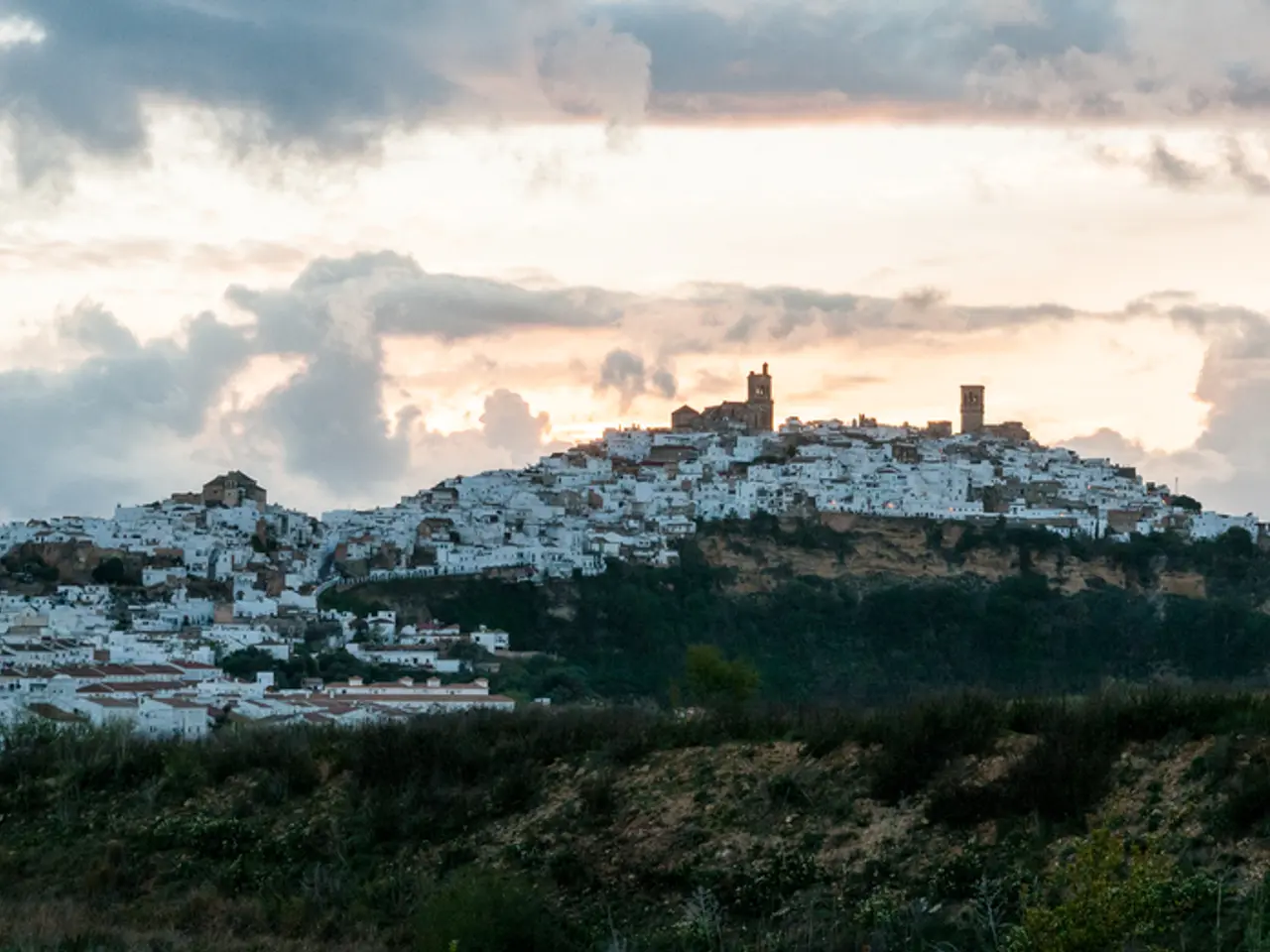Tourist influx incites dissent in the ancient core of Athens
In the heart of Athens, the historic neighbourhood of Plaka, nestled below the ancient Acropolis hill, is one of the world's 10 most-visited cities[1]. This vibrant district, known as "the neighbourhood of the gods," is Europe's oldest continuously inhabited neighbourhood, with significant Byzantine and Ottoman relics[2]. However, Plaka's charm and cultural character are under threat due to overtourism.
Athens is currently experiencing a surge in tourism, with the population of Plaka, originally about 2,000 locals, swelling to four times that number with tourists in summer[4]. This influx has led to soaring rents, forcing longtime residents to leave and threatening the area's historic ambiance beneath the Acropolis[1].
To address these issues, the Greek government, under conservative leadership, has banned new registrations of apartments on short-term rental platforms for at least a year in central Athens[3]. This move aims to curb rising rents and preserve housing availability for residents. However, the effectiveness of this measure is questionable, with reports of continued advertisements encouraging the conversion of apartments into short-term rentals[3].
Local associations, such as the Plaka district residents' association led by Giorgos Zafeiriou, are advocating for environmental and cultural heritage protection[2]. They recognise Plaka's unique history and the need to safeguard it for future generations.
Enforcement remains a critical issue. An "intervention unit" for Plaka was created to enforce rules with the support of the police[5]. However, Dimitris Melissas, a lawyer specialising in urban planning, stated that these rules have been dodged[6]. Residents can report offenders who encroach on public space or park cars on the pavement to this unit[5].
Tourism is a significant pillar of the Greek economy, with almost 4.5 million visitors to the Parthenon temple on the Acropolis last year[7]. This year, 10 million people are expected to visit Athens, an increase of two million from 2024[8]. The conservative government's ban on new short-term rental registrations is part of a broader European trend of balancing tourism growth with safeguarding local communities and historical sites[1][5].
Representing Ellet, a lawyer, has taken a case over the legality of 16 buildings converted entirely into seasonal rentals to the Council of State, Greece's top administrative court[9]. The future of Plaka's cultural heritage and housing availability hangs in the balance as the community and government work together to find solutions to the challenges posed by overtourism.
References: [1] The Guardian. (2022, June 17). Athens bans new short-term rentals in tourist hotspots. Retrieved from https://www.theguardian.com/world/2022/jun/17/athens-bans-new-short-term-rentals-in-tourist-hotspots [2] The New York Times. (2022, July 2). In Athens, a Fight Over Tourism and the Soul of a Historic Neighborhood. Retrieved from https://www.nytimes.com/2022/07/02/world/europe/athens-plaka-tourism.html [3] The Telegraph. (2022, June 17). Athens bans new short-term rentals in tourist hotspots. Retrieved from https://www.telegraph.co.uk/travel/europe/greece/articles/athens-bans-new-short-term-rentals-in-tourist-hotspots/ [4] CNN Travel. (2022, June 28). Athens struggles with overtourism in Plaka and other historic neighborhoods. Retrieved from https://www.cnn.com/travel/article/athens-overtourism-plaka-neighborhoods/index.html [5] Greek Reporter. (2022, July 1). Athens Creates Intervention Unit to Enforce Rules in Plaka. Retrieved from https://greece.greekreporter.com/2022/07/01/athens-creates-intervention-unit-to-enforce-rules-in-plaka/ [6] The New York Times. (2022, July 2). In Athens, a Fight Over Tourism and the Soul of a Historic Neighborhood. Retrieved from https://www.nytimes.com/2022/07/02/world/europe/athens-plaka-tourism.html [7] Statista. (2022). Number of visitors to the Acropolis Museum in Athens from 2010 to 2021. Retrieved from https://www.statista.com/statistics/1154347/number-of-visitors-acropolis-museum-athens/ [8] Greek City Times. (2022, June 17). Athens bans new short-term rentals in tourist hotspots. Retrieved from https://greekcitytimes.com/2022/06/17/athens-bans-new-short-term-rentals-in-tourist-hotspots/ [9] The Guardian. (2022, June 17). Athens bans new short-term rentals in tourist hotspots. Retrieved from https://www.theguardian.com/world/2022/jun/17/athens-bans-new-short-term-rentals-in-tourist-hotspots
Tourists flock to Plaka, a district in Athens, to experiencing its vibrant lifestyle that's rooted in its rich historical background, with travelers visiting to explore the area's significant Byzantine and Ottoman relics. However, the surge in tourism has led to issues, such as soaring rents and a threat to the area's historic ambiance, forcing longtime residents to leave.




